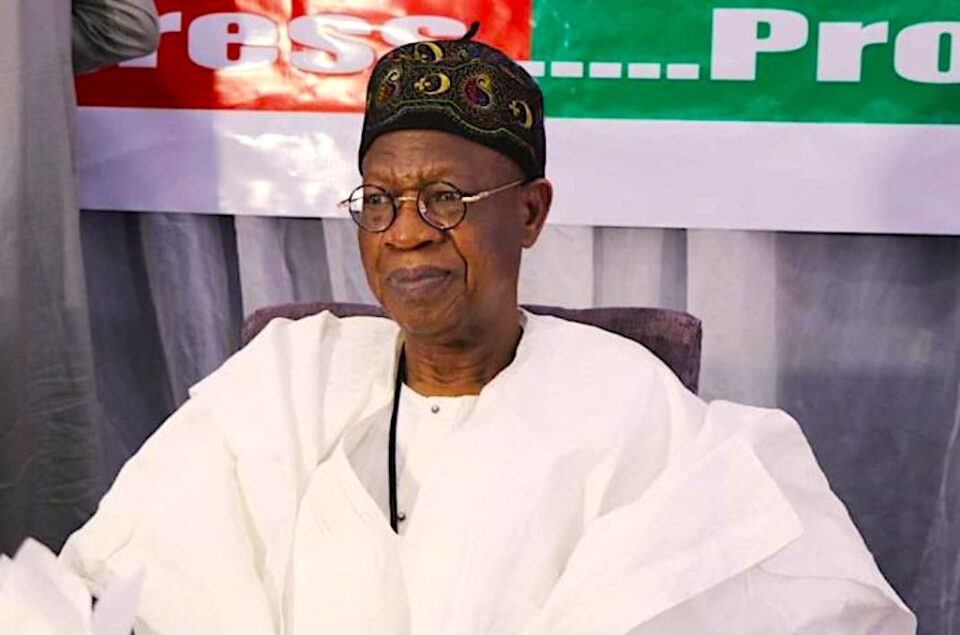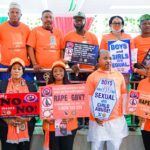By Felix Oboagwina
“Lai Mohammed just entered!” someone in our group whispered, as the lone figure sauntered into the departure lounge of the Nnamdi Azikiwe International Airport, in the nation’s capital Abuja, that fateful day around 2014. That chance encounter at the airport unveiled something significant
about the man and his method.
Dr. Frederick Fasehun and the rest of us in his entourage turned our heads to the direction the speaker nodded towards, as the slim man, leather bag in one hand and flight ticket in the other, made his way through the door, acknowledging some greeters.
Suddenly, both men locked eyes. The two had locked horns in the media over some statement Lai, then the Action Congress of Nigeria (ACN) Publicity Secretary, peddled about the elderly Founder of the Oodua People’s Congress (OPC). At the airport, we clustered around Fasehun, who had led our team from Lagos to Abuja to transact some business and were waiting for our flight to be announced.
In deference to the about 78-year-old man, the much younger ACN spokesperson made a beeline to the spot where we hung around Fasehun. They exchanged pleasantries. Nevertheless, the Doctor seized the opportunity to bring up the falsehood Lai lately peddled against him.
Chuckling, Lai retorted, “Doctor, forget it; we are only playing politics.”
What happened? Under the Jonathan administration, the Nigerian National Petroleum Corporation (NNPC) granted a pipeline security contract to Fasehun’s private company. The OPC Founder, through his private-owned New Age Global and Business Limited, was to provide about 35,000 personnel to safeguard NNPC pipelines in the South-West for one year in the first instance, running from 2015 to 2016. Lai had gone to town with the false narrative that Fasehun, who doubled as National Chairman of the Unity Party of Nigeria (UPN, originally founded by Chief Obafemi Awolowo in 1978 but billed for resuscitation by Fasehun and others), had been “settled” to support GEJ’s second-term bid and unsettle the South-West for ACN with an upfront payment of a monthly N2.4 billion camouflaged as a pipeline protection contract. Not only was the amount falsely overloaded, it glossed over the fact that NNPC did not pay the contractor as much as ONE KOBO in mobilisation fees. In an April 8, 2013 rejoinder that drilled holes in Lai’s falsehood, Fasehun, with equal vehemence, likened Mohammed to Joseph Goebbels, the propaganda Minister of Adolf Hitler in World War II.
Accusing the ACN spokesman of running a campaign of “misinformation, disinformation, lies and propaganda,” Fasehun submitted: “Lai is a liar.”
WHAT IS IN A NAME?
Lai owns a first name that rhymes with the word “lie.” It comes from an abridgement of the fuller “Layiwola,” itself an abridgement of “Olayiwola,” Yoruba for “Wealth Rolls Upon Wealth.” Ironically, the word out there is that the man who clocked 70 on December 6 has lived up to that ignominious sobriquet as party spokesperson and subsequently as the handler of the portfolio of Nigeria’s Minister for Information.
In July, 24 honourable members of his home Kwara State House of Assembly from a rival faction of his All Progressives Congress (APC) lampooned the Minister for stating that he singlehandedly sponsored their campaign, calling him a “liar who lies every day.” They said, “For Lai Mohammed, every day is another opportunity to tell a new lie.”
Such words have filtered into his home front. While facing a 2019 Senate hearing after re-nomination as a Minister, he sent legislators reeling with laughter when he narrated how his seven-year-old grandson wanted to know why Grandpa was called “Liar” Mohammed.
Even then, the man has not always been that way.
EARLY BEGINNINGS
Yomi Edu’s barren Third Republic bid to govern Lagos State brought me for the first time in close contact with Alhaji Lai Mohammed. Both men enjoyed a relationship that predated politics, and whose foundation appeared to have been laid in business. They ran a law partnership by the name of “Edu and Mohammed,” with an office on Broad Street, the very epicentre of the Lagos business district.
As journalists, the likes of Isa Hussein then of the News Agency of Nigeria (NAN), Ola Jones then of New Nigerian, my humble self for The Guardian and a few others constituted a Press caucus holding a weekly interactive session with Edu, who later emerged Lagos Gubernatorial Candidate for the Social Democratic Party (SDP) in 1992. Lai attended, sometimes. A good dresser, he, like Edu, exuded the aura of a complete gentleman. Although from Oro in Kwara State, Lai stood to play a crucial role should Epe, Lagos-born Yomi Edu win the election. Cerebral in his contributions at those sessions, Mohammed showed the journalists his humble and accommodating side, and demonstrated unalloyed commitment to his pal’s ambition. That adventure eventually hit the rocks in 1991 when victory instead went to Sir Michael Otedola, the Dark Horse in the two-horse race and father of nouveau riche billionaire Femi Otedola.
However, the man of destiny he has proved to be, Mohammed later had his triumphal entry into the Lagos corridors of power via another route. Senator Bola Tinubu, who had been in the Late General Musa Yar’Adua’s faction of SDP with Edu, became Lagos Governor at the advent of the Fourth Republic. Lai became Tinubu’s Chief of Staff.
Lai later ran as the Alliance for Democracy, AD’s Governorship Candidate for his home Kwara State in 2003. His bid tanked, however. Tinubu and his loyalists would later pull out of a truculent AD to form ACN and made Lai their new party’s Publicity Secretary. Here, the man’s contradictions welled up. Prior then, his closest tie to information management had been as the Chairman of Optmedia Limited, a subsidiary of the billboard giant, Afromedia Plc. A Fellow of the Nigerian Institute of Public Relations (NIPR), he had also spent a decade serving as Public Relations Officer for the renamed Federal Airports Authority of Nigeria (FAAN).
Nevertheless, it was in his new post as ACN party spokesperson that the man suddenly ignited a dormant side of him. Lai oozed the traits of the archetypal villain that Shakespeare says in All’s Well That Ends Well “will lie, sir, with such volubility, that you would think truth were a fool.” Lai routinely mangled information management. He equated his office squarely with propaganda. He suffered no qualms firing off outright falsehood. Those barbs he aimed at the ruling PDP, in a Machiavellian stratagem that cahooted with collaborating media such as the SaharaReporters. They gave the ruling PDP hell. However, apart from doing PDP dirty, Lai went muckraking on perceived allies of President Goodluck Jonathan. Fasehun’s experience was typical.
He apparently discharged his political role so satisfactorily at ACN that he won natural selection for the same role in the coalition that formed the All Progressives Congress (APC). When APC won the presidential election, November 2015 found Lai upgraded to Minister of Information by President Muhammadu Buhari. Trouble is that the lawyer politician has failed to draw the line between the dignity required of his new office and the Machiavellian ranting of a desperado propagandist. In Lai’s new post, many think him a misfit. Today, locally and internationally, anything that comes from the Buhari government must be taken with some “badass” dose of salt.
LIKE LAI, LIKE CHUKWUMERIJE
As Minister of Information, Lai, critics say, rates low on three strands that must interweave to validate the office: Believability, Charisma and Persuasiveness. They say his portfolio poverty is only rivalled by that of Comrade Uche Chukwumerije, General Ibrahim Babangida’s anti-June 12 Information Minister. Chukwumerije became notorious for dishing out scare propaganda that sent thousands of his Igbo kinsmen scampering in a presumptuous East-bound exodus from the South-West to unnecessary losses of lives, limbs and livelihoods.
Even then, Lai remains in his own class. The last six years have chalked up many booboos from Nigeria’s Information Minister. He flopped in declaring Boko Haram “technically defeated.” Despite their CHANGE mantra, he joined the regime in the distasteful habit of blaming the preceding PDP government for all wrongs. He lied about the President not being sick. When the United States in 2016 warned Americans against travelling to 20 of 36 “unsafe” Nigerian states, Lai fired back with, “There is no part of Nigeria that is not safe!” His role in the government’s kneejerk reaction to Twitter suspending the President’s account, which led to outlawing the micro-blogging platform, is considered infantile and stupid.
#ENDSARS PROBE AS MISSED OPPORTUNITY
Lai’s response to the #EndSARS Lagos panel report only succeeded to bury him further. Not only was Lai unconvincing and unscientific, he came across as presumptive, preposterous, flippant and subjective. Even worse, he internationalised his error of judgement by taking on CNN that has always reported a cover-up of killings. Allowed that the Lagos panel report had been released prematurely without the backing of its action document, the White Paper, Lai could still have managed the situation with better sanity and dignity. He and the government failed to clutch at the last plank to redeem their integrity over the #EndSARS saga. A saner mind would have found the panel’s submissions as an opportunity to plead that his previous yapping about “a massacre without corpses” had hung on misleading briefs by questionable security ops. He would then have announced that, in the light of the panel’s submission, the Federal Government would reopen enquiries into the October 20, 2020 Lekki Tollgate incident. Simple!
Unfortunately, Lai and the government lost that opportunity. Why?
As the airport encounter with Fasehun showed, Alhaji Lai Mohammed has remained fixated on the belligerence of a political party spokesman, even as Nigeria’s Information Minister; this dull caterpillar has failed to mature into the radiant butterfly of unassailable integrity befitting of his new calling.
FELIX OBOAGWINA IS AN AUTHOR AND JOURNALIST, AND HE WRITES FROM LAGOS



